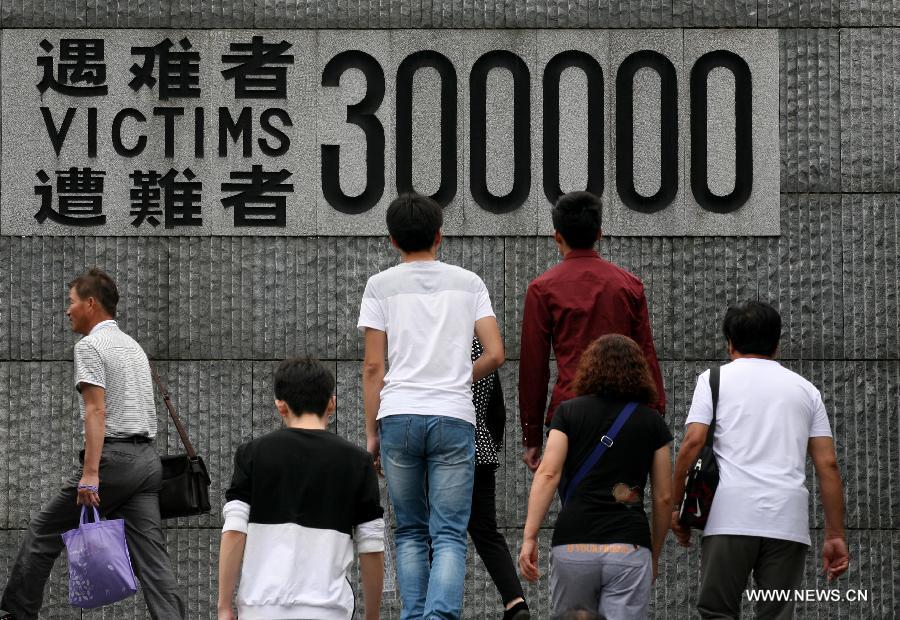UNESCO listing of Nanjing massacre shows global consensus
 0 Comment(s)
0 Comment(s) Print
Print E-mail Xinhua, October 10, 2015
E-mail Xinhua, October 10, 2015
|
|
| People visit the Memorial Hall of the Victims in Nanjing Massacre by Japanese Invaders in Nanjing, capital of east China's Jiangsu Province, Sept. 17, 2015. (Xinhua/Yan Minhang) |
Researchers and the public cheered as UNESCO listed Nanjing Massacre documents on Friday, saying the inscription marks an "international recognition and consensus" of records that have been distorted by the Japanese right wing.
Inscription of the dossier into the UNESCO's Memory of the World Register, created to preserve significant and endangered documents, was announced Friday on the website of the UN's scientific and cultural body.
"The inscription is superb encouragement for our work and a new start for research into Nanjing massacre, one of the greatest crimes ever perpetrated against humanity," said Zhu Chengshan, curator of the Nanjing Massacre Memorial Hall, who led the preparation for the 11 sets of documents.
China Foreign Ministry spokesperson Hua Chunying said on Friday that "Japan has taken some moves to obstruct China's application", which revealed its reluctance to face the history squarely.
Files on comfort women, also submitted to the UNESCO, was not added to the program.
On December 13, 1937, the invading Japanese army took Nanjing, the Chinese capital at the time, and killed an estimated 300,000 people in a rampage of rape, slaughter and destruction.
Right-wing Japanese nationalists have in various ways denied the massacre, either by refusing to recognize the numbers of victims, discrediting survivors, and even claiming that the carnage never happened.
"The UNESCO listing is global recognition. From now on, any act of denial will be impotent," said Zhu. "Inscription of the documents will help us honor history, refute wrong claims and disseminate the truth."
HONORING THE DECEASED
Xia Shuqin, 86, a survivor of the massacre, was unusually calm when she was told about the inscription. "All my life, I wanted the Japanese to stop denying. Now my whole family, who died at the hands of the Japanese, can finally close their eyes and rest in peace in the other world," she told Xinhua.
Xia and other survivors have spent their lives defending the part of history they lived through seven decades ago. Lu Qi, whose late mother Li Xiuying was another well-known survivor, said the listing is "the best consolation".
In the winter of 1937, Li was pregnant when she was assaulted by three Japanese soldiers. She suffered more than 30 knife wounds before she was saved by an American doctor. Li's rescue was filmed by American priest John Magee, chairman of the Nanjing committee of the international Red Cross organization. Her photos and film are part of the Memory of the World.
"The massacre pained my mother through her whole life, and she kept fighting to make sure history was not forgotten," said Lu, 61. Li Xiuying died in 2004.
INTERNATIONAL CONSENSUS
The Memory of the World Register, created in 1992, preserves precious and threatened material against neglect, ravages of time, willful and deliberate destruction.
Li Minghua, director of the state archives administration, which handed over the documents, said, "the Nanjing Massacre and comfort women records are fittingly significant according to the heritage standards."
Historians rank Nanjing as equal with Auschwitz, which is listed on the world cultural heritage.
The Nanjing massacre was forgotten partly because of the U.S. post-war policy towards Japan and the Cold War power game. "Until today, the tragedy has never been fully recognized and honored at the international level," Zhu said.
"Seven decades have passed since WWII, but the lessons of war have not been learned in some countries, and that is why we applied to list the documents," he said.
China started preparing for the application in 2009, and the administration passed the documents to the Memory of the World secretariat in March, 2014.
Among the documents submitted to UNESCO are 11 sets of archives relating to the massacre including film, photographs and texts from between 1937 and 1948. The documents show Japanese troops bombing Nanjing and killing unarmed Chinese. Some pictures show raped women in extreme pain and bodies scattered on the streets.
"The documents are China's most agonizing part of history. It fits to remind the whole mankind of the cruelty of war and importance of peace," said Zhang Sheng, director of the history institute of Nanjing University .
Jing Shenghong, history professor in Nanjing Normal University said "the listing has elevated national heritage to a common wealth, as a standing call to end of atrocities."
BETTER PRESERVATION
Historians say the inscription will lead to better conservation of the documents.
"We will carry out more detailed research and explore the impact of the atrocity on the victims and their families," said Zhu Chengshan.
Last year, China started to honor its first National Memorial Day for Nanjing Massacre victims on Dec. 13.
This year, the 70th victory anniversary of the end of China's war against Japanese invaders as well as WWII, has seen more visitors at the massacre memorial.
"I hope as part of global heritage, the massacre will be known to more people," said Zhu.







Go to Forum >>0 Comment(s)